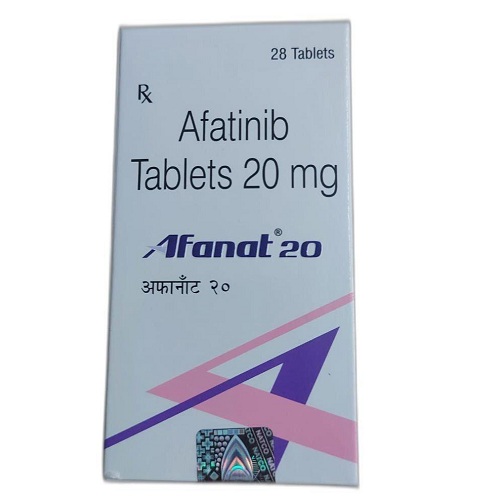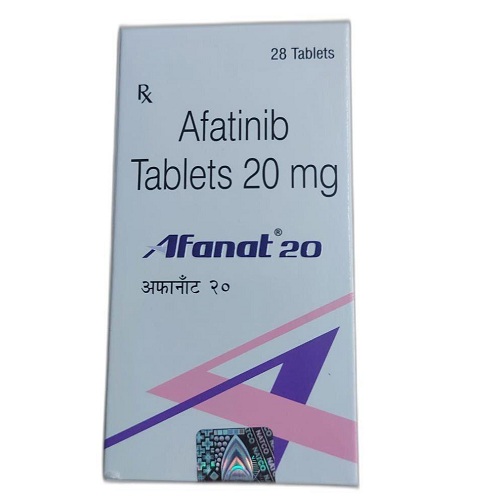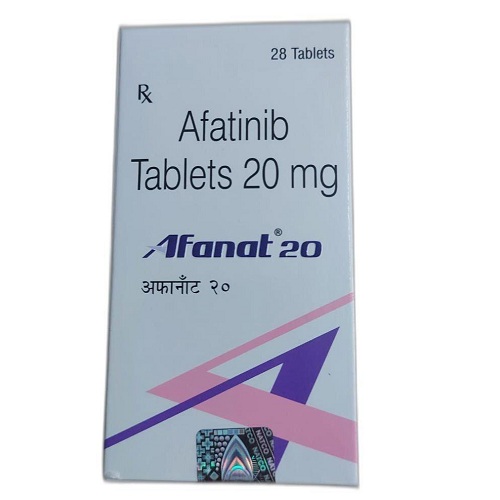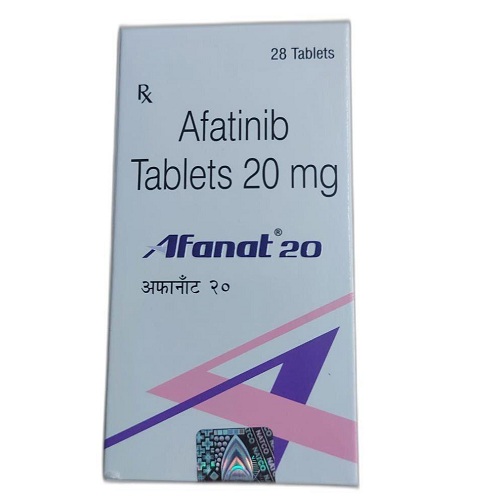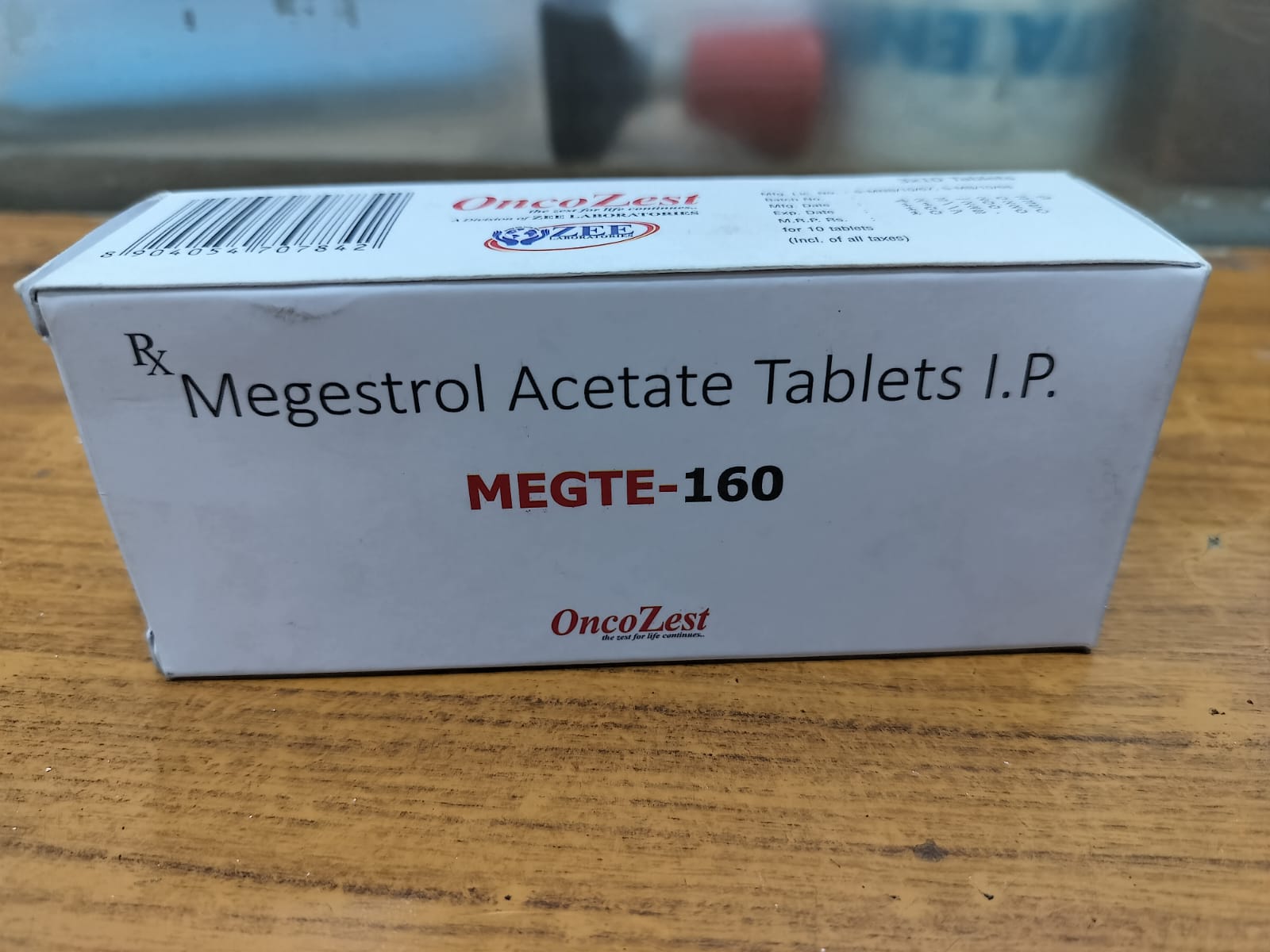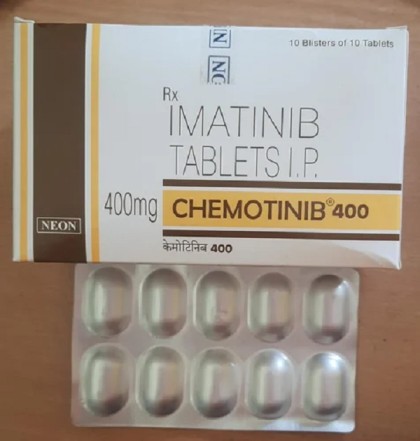Product Introduction:
Afanat contains Afatinib, an oral, irreversible tyrosine kinase inhibitor (TKI) that blocks multiple members of the ErbB family of receptors, particularly EGFR mutations found in some lung cancers. It is indicated for patients with EGFR-mutated advanced NSCLC and is taken once daily.
Uses:
Afanat is used in the treatment of:
-
EGFR mutation-positive non-small cell lung cancer (NSCLC)
-
Metastatic NSCLC
-
NSCLC with exon 19 deletions or exon 21 (L858R) substitutions
-
Second-line treatment in patients resistant to first-generation EGFR TKIs
-
Locally advanced or metastatic squamous NSCLC after chemotherapy
-
Maintenance therapy in certain lung cancers
Storage Instructions:
-
Store below 30°C
-
Keep in the original container and protect from moisture
-
Keep out of reach of children
-
Do not use after the expiry date
How It Works (Mechanism of Action):
Afatinib irreversibly inhibits EGFR (ErbB1), HER2 (ErbB2), and HER4 (ErbB4) receptors by blocking tyrosine kinase activity. This prevents downstream signaling involved in cancer cell proliferation, survival, and metastasis, especially in tumors with EGFR-activating mutations.
Side Effects:
Common side effects:
-
Diarrhea
-
Rash or acneiform dermatitis
-
Mouth sores (stomatitis)
-
Nail inflammation (paronychia)
-
Dry skin
-
Decreased appetite
Serious side effects:
-
Interstitial lung disease
-
Liver toxicity (hepatotoxicity)
-
Severe diarrhea leading to dehydration
-
Corneal ulcers or keratitis
-
Heart failure (rare)
Dosage (Typical Recommended Dose):
-
Standard starting dose: 40mg once daily
-
Can be reduced to 30mg or 20mg daily based on tolerability
-
Dose adjustments required for adverse reactions or organ impairment
Method of Administration:
-
Take once daily on an empty stomach (at least 1 hour before or 2 hours after a meal)
-
Swallow the tablet whole with water – do not crush or chew
-
Take at the same time each day for consistent therapeutic levels
Precautions:
-
Not recommended in patients with severe liver or kidney impairment without medical consultation
-
Regularly monitor liver function tests, cardiac function, and eye symptoms
-
Use with caution in patients with a history of lung disease or eye disorders
-
Effective contraception should be used during treatment and for at least 2 weeks after the last dose
-
Not recommended for use during pregnancy or breastfeeding
Drug Interactions:
-
Avoid strong P-glycoprotein (P-gp) inducers/inhibitors (e.g., rifampin, verapamil, ketoconazole)
-
May interact with antacids or proton pump inhibitors (affect absorption)
-
No significant interaction with CYP enzymes – metabolism mainly via P-gp efflux
Allergies:
-
Contraindicated in patients with known hypersensitivity to Afatinib or any excipient
-
Seek immediate help in case of rash, swelling, or breathing difficulty
Overdose Information:
-
Overdose may result in severe diarrhea, skin rash, liver dysfunction, or dehydration
-
Provide supportive care – hydration, electrolyte management, and symptomatic relief
-
Contact emergency medical services immediately
Missed Dose Instructions:
-
If you miss a dose, take it as soon as you remember
-
Skip the missed dose if it's less than 12 hours to the next dose
-
Do not take two doses at the same time
Additional Notes:
-
Patients should stay hydrated and report persistent diarrhea or eye problems
-
Dermatological and gastrointestinal side effects are common but manageable with early intervention
-
Treatment should be continued until disease progression or unacceptable toxicity occurs

